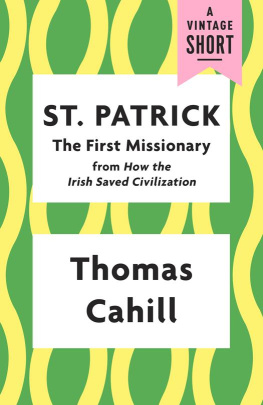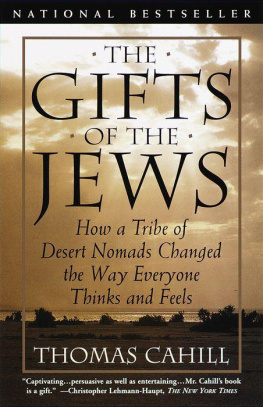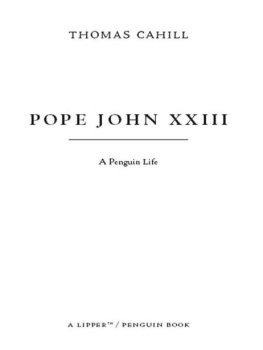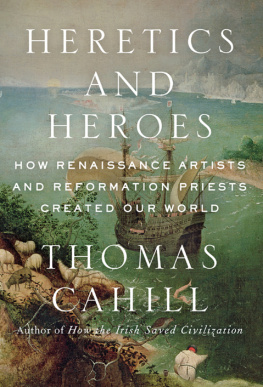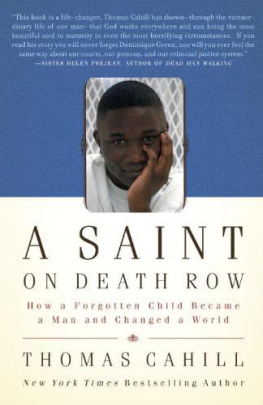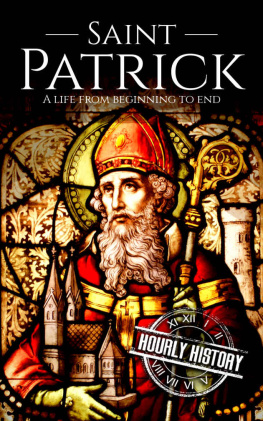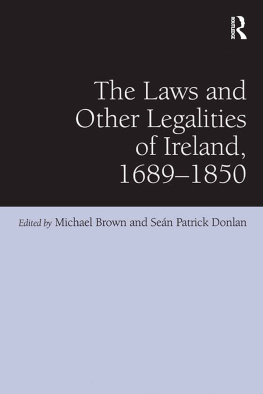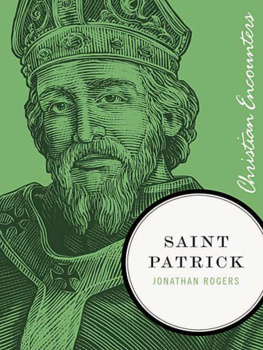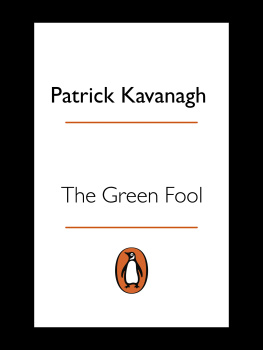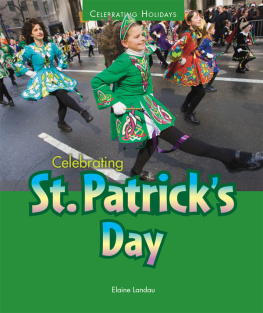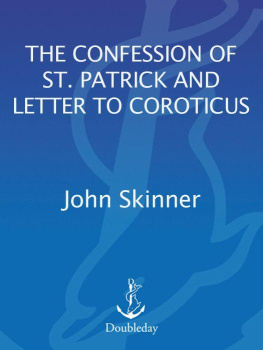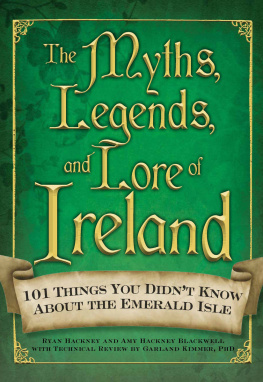Thomas Cahill
Thomas Cahills appealing approach to distant history has won the attention of millions of readers in North America and beyond. Cahill is the author of six volumes in the Hinges of History series: How the Irish Saved Civilization , The Gifts of the Jews , Desire of the Everlasting Hills , Sailing the Wine-Dark Sea , Mysteries of the Middle Ages , and Heretics and Heroes . They have been bestsellers not only in the United States but also in countries ranging from Italy to Brazil. He is also the author of A Saint on Death Row.
www.thomascahill.com St. Patrick: The First Missionary
from How The Irish Saved Civilization
by Thomas Cahill
A Vintage Short
Vintage Books
A Division of Penguin Random House LLC
New York
Copyright 1995 by Thomas Cahill
All rights reserved. Published in the United States by Vintage Books, a division of Penguin Random House LLC, New York, and in Canada by Random House of Canada, a division of Penguin Random House of Canada Ltd., Toronto. Originally published in hardcover as part of How the Irish Saved Civilization by Nan A. Talese/Doubleday, a division of Penguin Random House LLC, New York, in 1995.
Vintage and colophon are registered trademarks of Penguin Random House LLC.
The Cataloging-in-Publication Data for How the Irish Saved Civilization is available from the Library of Congress.
Vintage eShort ISBN: 978-1-101-97002-7
Series cover design by Joan Wong
www.vintagebooks.com
v3.1
Contents
No man is a hero to his valet. Still less could an Iron Age Irish warrior be a hero to his British slave, a boy who had spent his first sixteen years amid the comfort and predictability of a Roman civitas .
If legendary hero Cuchulainn slew one hundred and thirty kings on Murtheimne Plain, Ireland must have had hundreds of such kingsto one of whom Patricius was bound. His name was Miliucc, and of him we know nothing but that he ruled some hills of Antrim between Lough Neagh and the mountains of Sliabh Mis. Ri , the Irish word for king, is cognate with the Latin rex , butto our eyes, at leastthese kings would appear to be petty chieftains, local strongmen ruling over a few dozen extended families of cattle ranchers. Rustlers might be more accurate, for here was little right except might. The epic depredations of the Tain are, after all, but enlargements of a common way: cattle raids, directed by one noble family against another, were among the events of daily life.
The life of a shepherd-slave could not have been a happy one. Ripped out of civilization, Patricius had for his only protector a man who did not hold his own life highly, let alone anyone elses. The work of such shepherds was bitterly isolated, months at a time spent alone in the hills. The occasional contacts, which one might normally seek out, could bring their own difficulties. Deprived of intercourse with other humans, Patricius must have taken a long time to master the language and customs of his exile, so that the approach of strangers over the hills may have held special terror.
We know that he did have two constant companions, hunger and nakedness, and that the gnawing in his belly and the chill on his exposed skin were his worst sufferings, acutely painful presences that could not be shaken off. From this scant informationPatricius is not a man of many wordswe can deduce that the boy had a hardy constitution and had probably been a beloved and well-nourished child; otherwise, he could not have survived.
Like many another in impossible circumstances, he began to pray. He had never before paid attention to the teachings of his religion; he tells us that he didnt really believe in God, and he found priests foolish. But now, there was no one to turn to but the God of his parents. One is reminded of the reports of contemporary hostages about how they make it through the dreary years of captivity. Tending flocks was my daily work, and I would pray constantly during the daylight hours. The love of God and the fear of him surrounded me more and moreand faith grew and the Spirit was roused, so that in one day I would say as many as a hundred prayers and after dark nearly as many again, even while I remained in the woods or on the mountain. I would wake and pray before daybreakthrough snow, frost, rainnor was there any sluggishness in me (such as I experience nowadays) because then the Spirit within me was ardent.
Patricius endured six years of this woeful isolation, and by the end of it he had grown from a careless boy to something he would surely never otherwise have becomea holy man, indeed a visionary for whom there was no longer any rigid separation between this world and the next. On his last night as Miliuccs slave, he received in sleep his first otherworldly experience. A mysterious voice said to him: Your hungers are rewarded: you are going home.
Patricius sat up, startled. The voice continued: Look, your ship is ready.
Miliuccs farm was inland, nowhere near the sea, but Patricius set out, whither he knew not. He walked some two hundred miles, through territory he had never covered before, without being stopped or followed, and reached a southeastern inlet, probably near Wexford, where he saw his ship. As he tramped toward his destiny, his faith that he was under Gods protection must have grown and grown, for it was virtually impossible that a fugitive slave could get so far without being intercepted. I came in Gods strength and had nothing to fear is Patriciuss simple summation.
The sailors were loading a cargo of Irish hounds for sale on the continent, where they were highly prized. Patricius approached the captain, who eyed him suspiciously. He showed the captain that he had the wherewithal for his passage (where he got it well never know!), but the captain told him curtly: Youre wasting your time asking to sail with us.
This was Patriciuss moment of greatest danger: recognized as a fugitive in a seaside settlement, he could not expect to remain at liberty many minutes more. Hearing this response, I left them to go to the hut where I was staying, and on the way I began to pray and before I had finished my prayer I heard one of the sailors shouting after me: Come quickly, theyre calling you! And right away I returned to them and they began to say to me: Come on board, well take you on trust. They even offered their nipples to be sucked, the ancient Irish version of kiss and make up. Patricius, too much the Roman for such outr goings-on, held backhe says for fear of God, but better minds than Patriciuss have succumbed to a confusion of Roman custom and Christian faith. The sailors shrugged: You can make friends with us however you like. Patricius jumped on board, and they sailed at once.
It took three days to cross to the continent, and as they left their ship and journeyed inland they found only devastation desertum, Patricius calls itthrough which they trudged for two weeks. Where on the continent is there a desert that takes hardy sailors two weeks to cross? Nowhere. But this may well have been the year 407the very year that hundreds of thousands of hungry Germans had crossed the icy Rhine, wreaking devastation through much of Gaul. Irish sailors would have been unlikely to have heard news of this invasion, so the little party of exporters may have arrived in the wake of the German war parties. At any rate, they can discover neither a single human being nor a meal. The dogs, as well as the men, are close to expiring, collapsed and half-dead by the side of the road.
How about it, Christian? taunts the captain. You say your god is great and all-powerful, so why cant you pray for us? Were starving to death, and theres little chance of our ever seeing a living soul! Its hard to know whether the captain would have spoken Irish or Latin to Patricius; but Patricius, though his Latin is abysmally awkward at times, has a good ear for dialogue. Here is the original, which gives us an excellent idea of how ordinary men used the tongue of Cicero: Quid est, Christiane? Tu dicis deus tuus magnus et omnipotens est; quare ergo non potes pro nobis orare? Quia nos a fame periclitamur; diffcile est enim ut aliquem hominem umquam videamus!
Next page
